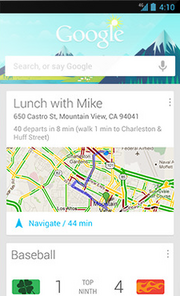Google Now was an intelligent personal assistant developed by Google, which then superseded by Google Assistant in 2016. It is available within the Google Search mobile application for the Android and iOS operating systems, as well as the Google Chrome web browser on personal computers. Google Now uses a natural language user interface to answer questions, make recommendations, and perform actions by delegating requests to a set of web services. Along with answering user-initiated queries, Google Now passively delivers information to the user that it predicts they will want, based on their search habits. It was first included in Android 4.1 ("Jelly Bean"), which launched on July 9, 2012, and was first supported on the Galaxy Nexus smartphone. The service was made available for iOS on April 29, 2013 in an update to the Google Search app, and later for Google Chrome on March 24, 2014. Popular Science named Google Now the "Innovation of the Year" for 2012.
History[]
In late 2011, reports surfaced that Google was greatly enhancing their product Google Video Search for the next version of Android. It was originally codenamed "Majel" after Majel Barrett, the wife of Gene

Google Now on the Galaxy Nexus.
Roddenberry, and well known as the voice of computer systems in his Star Trek franchise; it was also codenamed "assistant".
On June 27, 2012, Google Now was unveiled as part of the premier demonstration of Android 4.1 Jelly Bean at the Google I/O.
On October 29, 2012, Google Now received an update through the Google Play Store bringing the addition of Gmail cards. Google Now displays cards with information pulled from the user's Gmail account, such as flight information, package tracking information, hotel reservations and restaurant reservations (as long as the Gmail account is not a Google Apps account). Other additions were movies, concerts, stocks and news cards based on the users location and search history. Also included is creating calendar events using voice input. On December 5, 2012, an update to the Google Search application brought several new features to Google Now, including cards for: nearby events; searching by camera when at a museum or shop; airplane boarding passes found from e-mail (United Airlines only, more airlines to come); weather at upcoming travel destinations; birthday reminders; and monthly summaries of biking and walking activities. New voice action features included with this update include the ability to post to Google+, song recognition capabilities, and the ability to scan bar codes. However, when the Search 2.5 update hit, Google removed "Search With Camera" feature for unknown reasons.
On March 21, 2013, the executive Chairman of Google, Eric Schmidt, stated that Google has submitted an iOS version of Google Now to Apple for review and that the app was awaiting approval, but he later clarified that this was not true after Apple denied this was the case. Despite this, on April 29, 2013, Google Now was made available for iOS in an update to the operating system's Google Search application.
Based on Google Chrome code review logs from December 2012, Google Now was expected to be integrated into the desktop version of Google Chrome. According to Seth Rosenblatt of CNET, it is rumored that Google Now will also serve as iGoogle's replacement in November 2013. On May 15, 2013, at Google I/O 2013, Google announced the upcoming release of Google Now on desktop platforms; the feature will be accessible only via Google Chrome or Google Chrome OS. On January 16, 2014, an alpha version of the Google Now was made available on desktop through the Google Chrome Canary release although this app lacks some of the cards available on mobile version of Google Now such as public alerts, nearby photos, activity summary and stocks. On March 24, 2014, Google started rolling out Google Now for Google Chrome users who are signed in to their Google Account on the browser.
Functionality[]
Google Now is implemented as an aspect of the Google Search application. It recognizes repeated actions that a user performs on the device (common locations, repeated calendar appointments, search queries, etc.) to display more relevant information to the user in the form of "cards". The system leverages Google's Knowledge Graph project, a system used to assemble more detailed search results by analyzing their meaning and connections.
Reception[]
Scott Webster of CNET praised Google Now for its ability to remind users of events based on past location histories and check-ins and further commended it for providing "information instantly in a clean, intuitive manner" without the user requesting it. Critically, a review by Ryan Paul of Ars Technica claims that like most other voice activated apps, including Siri, voice recognition is a major issue. However, Paul noted that the ability to type queries provides users with more options. Some commentators have noted that the predictive power of Google Now reveals "exactly how much data and information Google actually has about [users'] routines and daily lives."

